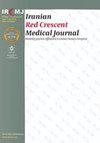Reliability and Validity of Persian Version of WHO Mass Gathering COVID-19 Risk Assessment Tool- Generic Events in Iranian Population
IF 0.2
4区 医学
Q3 MEDICINE, GENERAL & INTERNAL
引用次数: 0
Abstract
Background: The risk of transmission of COVID-19 infection significantly increases with mass gatherings during the pandemic. According to WHO recommendations, the decision to hold, modify, postpone, or cancel gatherings of any size during the COVID-19 pandemic should rely on a risk-based approach. WHO Mass Gathering COVID-19 Risk Assessment tool-Generic Events, to the best of our knowledge, has not been translated into Persian and its reliability and validity have not been determined in the Iranian population. Objectives: The present study aimed to assess the reliability and validity of the Persian version of the WHO Mass Gathering COVID-19 risk Assessment tool-Generic Events in the Iranian population. Methods: The content and face validity of the final Persian version of the WHO Mass Gathering COVID-19 Risk Assessment tool- Generic Event, Version 2 (10 July 2020) was confirmed by five experts and the WHO office in Tehran, Iran. Then, the tool was completed by 17 Iranian adults on two occasions at least two weeks after a hypothetical mass gathering event. The participants were mainly selected from the personnel of the Iranian red crescent society. All of them had a bachelor's or higher university degree in health sciences. The data were analyzed using SPSS software and related statistical tests (Pearson correlation coefficient). Results: Risk evaluation and risk mitigation questions of the Persian version of the tool had high reliability on two occasions at least two weeks after a hypothetical mass gathering event based on the Pearson correlation coefficient (r=0.81, P-value=0.03 for risk evaluation and r=0.75, P-value=0.04 for risk mitigation questions based on their final scores). Conclusion: The Persian version of the tool can be used to classify the risk of mass gatherings for COVID-19 infection.世界卫生组织大规模集会新冠肺炎风险评估工具波斯版的可靠性和有效性——伊朗人群中的一般事件
背景:大流行期间,随着人群聚集,COVID-19感染传播的风险显著增加。根据世卫组织的建议,在2019冠状病毒病大流行期间,决定举行、修改、推迟或取消任何规模的聚会都应基于基于风险的方法。据我们所知,《世卫组织大规模聚集COVID-19风险评估工具-一般事件》尚未翻译成波斯语,其在伊朗人口中的可靠性和有效性尚未确定。目的:本研究旨在评估世卫组织大规模聚集性COVID-19风险评估工具-伊朗人群中的一般事件波斯语版的可靠性和有效性。方法:五名专家和世卫组织驻伊朗德黑兰办事处确认了《世卫组织大规模聚集性COVID-19风险评估工具-一般事件第2版(2020年7月10日)》最终波斯语版本的内容和表面有效性。然后,该工具由17名伊朗成年人在两次场合完成,至少在假设的大规模集会事件发生两周后完成。与会人员主要从伊朗红新月会人员中选拔。他们都拥有健康科学学士学位或更高的大学学位。采用SPSS软件及相关统计检验(Pearson相关系数)对数据进行分析。结果:基于Pearson相关系数(基于最终得分的风险评估和风险缓解问题r=0.81, p值=0.03,风险缓解问题r=0.75, p值=0.04),该工具波斯语版的风险评估和风险缓解问题在假设的大规模聚集事件发生至少两周后的两个场合具有高可靠性。结论:波斯语版工具可用于COVID-19感染人群聚集风险分类。
本文章由计算机程序翻译,如有差异,请以英文原文为准。
求助全文
约1分钟内获得全文
求助全文
来源期刊

Iranian Red Crescent Medical Journal
MEDICINE, GENERAL & INTERNAL-
CiteScore
1.16
自引率
0.00%
发文量
0
期刊介绍:
The IRANIAN RED CRESCENT MEDICAL JOURNAL is an international, English language, peer-reviewed journal dealing with general Medicine and Surgery, Disaster Medicine and Health Policy. It is an official Journal of the Iranian Hospital Dubai and is published monthly. The Iranian Red Crescent Medical Journal aims at publishing the high quality materials, both clinical and scientific, on all aspects of Medicine and Surgery
 求助内容:
求助内容: 应助结果提醒方式:
应助结果提醒方式:


